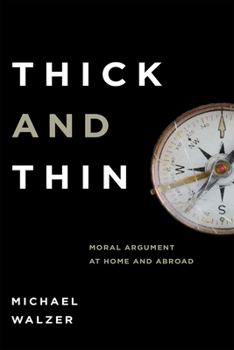Thick and Thin: Moral Argument at Home and Abroad
Select Format
Select Condition 
Book Overview
In Thick and Thin: Moral Argument at Home and Abroad, Michael Walzer revises and extends the arguments in his influential Spheres of Justice, framing his ideas about justice, social criticism, and national identity in light of the new political world that has arisen in the past three decades. Walzer focuses on two different but interrelated kinds of moral argument: maximalist and minimalist, thick and thin, local and universal. This...
Format:Paperback
Language:English
ISBN:0268018979
ISBN13:9780268018979
Release Date:February 2019
Publisher:University of Notre Dame Press
Length:128 Pages
Weight:0.35 lbs.
Dimensions:0.4" x 5.5" x 8.4"
Customer Reviews
2 ratings
Walzer's Thick and Thin
Published by Thriftbooks.com User , 20 years ago
One can quite easily make the case that John Rawls, at least to a certain degree, laid the foundation for contemporary political thought. Michael Walzer, in the environment of said contemporary political theory, has certainly had his influence; and quite deservedly so. What is perhaps his best work concerning social justice is: Spheres of Justice, published in 1983. Thick and Thin; A Moral Argument at Home and Abroad, is essentially marketed as an attempt at expounding upon the notions put forth in, Spheres of Justice. The work is a collection of five essays combined to total 108 pages. The first three chapters fail to make any contribution to the aforementioned, Spheres of Justice. The last two chapters do, however. Chapter Four gives insight into how his spheres and concepts of pluralism are to be applied to the international world. The fifth chapter illuminates notions of the make-up of the social critic and political theorist. While not truly building upon, Spheres of Justice, this book will be both interesting and beneficial for those seriously interested in modern political discourse and theory, while the occasional reader of political philosophy will be rather dissapointed.
Michael Walzer on Thick and Thin
Published by Thriftbooks.com User , 22 years ago
It has become widely popular to draw connections and similarities between the different people in our contemporary world. This might be done in terms of natural or universal human rights or in other ways, which aim to emphasise that we are all part of a common humanity and that we all share similar values despite our cultural differences. There is allegedly some basic morality, which we all share, and on this minimalist morality it is possible to build a thicker or maximalist understanding of morality. Michael Walzer in his book Thick and Thin: Moral Argument at Home and Abroad argues that what is in question is much more complicated than that.Despite its relatively limited number of pages (104 pages), Thick and Thin takes its reader on a voyage of discovering oneself. In the five chapters Michael Walzer approaches our understandings of morality and justice by initially explaining why it was possible or perhaps easy to sympathise with the people marching on the streets of Prague in 1989. In each consequent chapter, Walzer deepens his argument about the necessity of re-understanding our own minimalist and maximalist concepts of morality and how this is important not only in explaining domestic and international issues, but also in understanding them. In the final chapter, Walzer identifies how complex understandings are shaped and constructed by examining the divided self.Originally the five chapters of Thick and Thin were first brought together as Lectures in Political Analysis at Loyola University, Chicago, in 1993 and published by University of Notre Dame Press the following year in the same form. As Walzer recognises, they are an extension to his earlier work such as Just and Unjust Wars and Spheres of Justice, and a response to the criticism he has received to his earlier work and ideas. Equally importantly, Walzer aims to strengthen his arguments in the new political world `marked by the collapse of the totalitarian project'. In his colourful and intricate fashion, Walzer is able to appeal to the common reader and the specialist. Although he concentrates on such issues as self-determination and intervention, the basic principles of respect for the plurality of human societies and that there is no single, universal way in human affairs can be applied also elsewhere. We all share a minimalist morality in the sense that we could have marched with the people in Prague or Tienanmen Square in the name of freedom or justice, but `while we march in spirit with the men and women in Prague, we have in fact our own parade.' We can unite behind a banner of justice, but how we understand its meaning is the constructed product of time and place. George Orwell's claim that `there's a statue inside every block of stone' does not hold to Walzer, who argues that Orwell's statue does not represent true minimalism. Minimalism, according to Walzer, begins with the statue that is then in a moment of crisis hastily constructed as a sketch, stick figure, to wh






